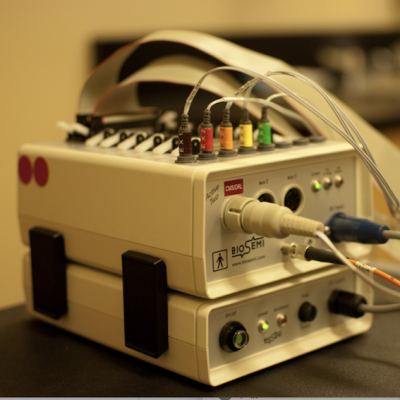Biosemi Active2脑电系统采用主动电极技术,直流模式采集脑电信号,24bit分辨率,小巧的第二代主动式电极使得Active2产品在采集原始脑电信号方面提供更丰富的细节,Active2产品可提供16/32/64/128/256等多种配置方案,进行多通道同步采集,另提供8通道双极导联用于采集EXG信号(如心电,肌电等),满足您的科研需
产品特点:
· 电池供电,减少工频干扰,机身小巧,便携;
· 光纤传输数据,数据保真度高;
· 通道数可选:16/32/64/128和256导联,可扩展性强
· 主动式电极,前端信号放大,保证采集信号可靠以及高效,节省实验准备时间;
· 直流采集,高采样率与高带宽,确保数据采集质量;
· 8kHZ及以上的高采样率,高输入范围;
· 全世界上千家用户以及6000+sci文章,世界知名。
经典文章节选:
1.Edelman B, Meng J, Suma D, Zurn C, Nagarajan E, Baxter B, Cline C, He B. Noninvasive neuroimaging enhances continuous neural tracking for
robotic device control. Science Robotics 2019;4: eaaw6844.
2.Faller J, Cummings J, Saproo S, Sajda P. Regulation of arousal via online neurofeedback improves human performance in a demanding
sensory-motor task. Proceedings of the National Academy of Sciences2019;116: 6482-6490
3.Broderick MP, Anderson AJ, Di Liberto GM, Crosse MJ, Lalor EC. Electrophysiological correlates of semantic dissimilarity reflect the
comprehension of natural, narrative speech. Current Biology 2018;28: 803-809. e803.
4.Ganesh G, Nakamura K, Saetia S, Tobar AM, Yoshida E, Ando H, Yoshimura N, Koike Y. Utilizing sensory prediction errors for movement intention
decoding: A new methodology. Science advances 2018;4: eaaq0183.
5. Gaspar JM, McDonald JJ. High Level of Trait Anxiety Leads to Salience-Driven Distraction and Compensation. Psychological science 2018;29: 2020-2030.
6.Pizzagalli DA, Webb CA, Dillon DG, Tenke CE, Kayser J, Goer F, Fava M, McGrath P, Weissman M, Parsey R. Pretreatment rostral anterior cingulate
cortex theta activity in relation to symptom improvement in depression:a randomized clinical trial. JAMA psychiatry 2018;75: 547-554.
7. Harris AM, Dux PE, Mattingley JB. Detecting unattended stimuli depends on the phase of prestimulus neural oscillations. Journal of Neuroscience 2018;38: 3092-3101.
8.Breska A, Deouell LY. Neural mechanisms of rhythm-based temporal prediction: Delta phase-locking reflects temporal predictability but not
rhythmic entrainment. PLoS biology 2017;15: e2001665.
9.Lee M, Sehatpour P, Hoptman MJ, Lakatos P, Dias EC, Kantrowitz JT, Martinez AM, Javitt DC. Neural mechanisms of mismatch negativity
dysfunction in schizophrenia. Molecular psychiatry 2017;22: 1585.
10.Perry A, Saunders SN, Stiso J, Dewar C, Lubell J, Meling TR, Solbakk A-K, Endestad T, Knight RT. Effects of prefrontal cortex damage on
emotion understanding: EEG and behavioural evidence. Brain 2017;140: 1086-1099.
11.Murphy PR, Boonstra E, Nieuwenhuis S. Global gain modulation generates time-dependent urgency during perceptual choice in humans. Nature communications 2016;7: 13526.
12.Nelson BD, Perlman G, Klein DN, Kotov R, Hajcak G. Blunted neural response to rewards as a prospective predictor of the development of
depression in adolescent girls. American Journal of Psychiatry 2016;173: 1223-1230.
13.Swann NC, de Hemptinne C, Aron AR, Ostrem JL, Knight RT, Starr PA. Elevated synchrony in P arkinson disease detected with
electroencephalography. Annals of neurology 2015;78: 742-750.
14.O'connell RG, Dockree PM, Kelly SP. A supramodal accumulation-to-bound signal that determines perceptual decisions in humans. Nature neuroscience 2012;15: 1729.
15.Zanto TP, Rubens MT, Thangavel A, Gazzaley A. Causal role of the prefrontal cortex in top-down modulation of visual processing and
working memory. Nature neuroscience 2011;14: 656.
16. Voytek B, Davis M, Yago E, Barceló F, Vogel EK, Knight RT. Dynamic neuroplasticity after human prefrontal cortex damage. Neuron 2010;68: 401-408.







